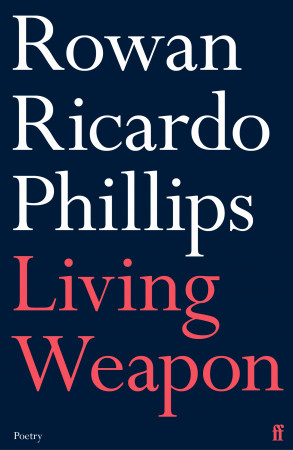Living Weapon
Rowan Ricardo Phillips,
(Faber, 2021); pbk, £10.99
Shining through the darkness of our contemporary moment comes Living Weapon, a compositional tour de force that sings to our anxieties of the present. Covering everything from the pandemic to technology and black lives matter, this slim collection belongs to the increasingly popular form of civic poetry. Rowan Ricardo Phillips handles these thematic concerns with levity and a conciseness of language, as exemplified in ‘Obsolete Machinery’ where he depicts the scenes from the Charlottesville rallies:
In the crowd, your matching tiki torches
Almost touching in the trolling twilight.
A Southern Cross and someone dumb enough
To drive the car. Wake up! We’ve sent tin cans
Past Neptune. It’s the twenty-first century.
(‘Obsolete Machinery’)
The collection begins with ‘Prelude’, a poem about the loss of Phillip’s grandmother to Covid, and ends with ‘Screens’, a reflection on the aftermath of George Floyd’s murder, so that these two snapshots of the year bookend the collection. The rest of the poems flow without section breaks and are meant to be read in one sitting, offering a lens through which to view and think about topical issues. In ‘Prelude’, the virus hangs over the air of our present moment, a forbidding fog that creates tension and spatial awareness in the poem:
I watched from the safe distance of an app
As my mother and uncle, masked among
The masked few in a pewless space, made peace
With the orphans who’d come to take their place.
(‘Prelude’)
‘1776’ follows, rising above this fog and giving space to breathe as Phillips imagines himself flying above New York’s skyline, a welcome note of surrealism after theall too familiar beginning.This poem adopts a long narrative prose form, in contrast to his other, more strict verse additions elsewhere in the collection. In ‘Tradition and the Individual Talent’ Phillips takes the first line from Blake, then cuts the poem short with an abrupt second and final line, symbolising a life cut short from police brutality in modern America:
wandered through each chattered street
Till I was shot by the police.
(‘Tradition and the Individual Talent’)
These variations in form are held together with an execution that feels conversational. Phillips addresses his audience as if in dialogue, almost speaking reflexively above the poems themselves. These meta-fictional tendencies are on display in ‘1776’:
Hovering here, I thought for once to try to remember it all;
I thought this would be a remarkable moment…
but do I sound remarkable to you?
(‘1776’)
Experimental in form and tonally playful, Living Weapon evinces Phillips’s love of language and his interest in the arts are evident in these poems. Poetry and music are thought of as ethereal figures emanating from the page, and these ruminations echo throughout the collection, providing a counterweight to the weightier issues of pain and injustice. In ‘Halo’ Phillips instructs us on how to use his poetry:
nd although this isn’t true, the poem says
This is true; life, light, flowers and bee: truths.
So stop and hold this poem above your head.
Hold it up to whatever light you find.
Then let it go: forget it, if you can.
If it is meant to remain it will remain.
(‘Halo’)
Ultimately Phillips suggests poetry is a gift, a thing to lift the spirits or inspire hope. With discursive markers in titles and lines resonant with history (let alone literary history), Phillips works with and against tradition, putting into play a poetics that is alive to absences and erasures. Inclusive and necessary, Living Weapon offers us a way to look at our world and see past the violence or pain to recover a sense of community. Might we suppose that the title then refers to the purpose of this collection? Poetry as a ‘living weapon’ to combat the ills of our time? The artistic spirit in Phillips certainly thinks so.
Jessica Stevenson


Leave a Reply